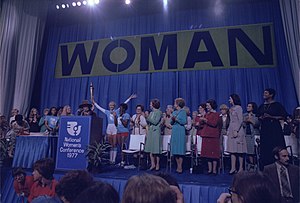 The arrival of the torch, carried by a relay of women runners from Seneca Falls, New York, to Houston, Texas, during the Opening Ceremonies of the Conference. Conference Chairperson Bella Abzug (behind the podium); First Ladies Rosalynn Carter, Betty Ford, and Lady Bird Johnson (front row on right, L-R in green, blue, and red); and poet Maya Angelou (far right) on stage. | |
| Date | November 18–21, 1977 |
|---|---|
| Duration | 3 days |
| Venue | Sam Houston Coliseum |
| Location | Houston, Texas |
| Theme | Women's issues, ratification of the Equal Rights Amendment |
| Budget | $5,000,000 |
| Organised by | National Commission on the Observance of International Women's Year |
| Outcome | The Spirit of Houston |
The National Women's Conference of 1977 was a four-day event during November 18–21, 1977, as organized by the National Commission on the Observance of International Women's Year. The conference drew around 2,000 delegates along with 15,000-20,000 observers in Houston, Texas, United States.[1][2] The United States Congress approved $5 million in public appropriations for both the state and national conferences as HR 9924, sponsored by Congresswoman Patsy Mink, which Ford signed into law.[3][4] In 1977 at the start of his presidency, President Jimmy Carter chose a new Commission and appointed Congresswoman Bella Abzug to head it. Numerous events were held over the next two years, culminating in the National Women's Conference.[5]
The conference represents a turning point for the political history of second-wave feminism in the United States. A number of controversial issues, including abortion rights and sexual orientation, were flashpoints in the event's program. Historian Marjorie J. Spruill argues that the anti-feminists led by Phyllis Schlafly had a more successful follow-up. They moved the Republican Party to a more socially conservative position.[6] As the Reagan administration came into office in January 1981, much of the political support for the conference and its output, The Spirit of Houston, dissipated in national politics.
- ^ Cottrell, Debbie Mauldin (June 15, 2010). "National Women's Conference, 1977". Handbook of Texas Online. Texas State Historical Association. Retrieved 9 March 2014.
- ^ Quindlen, Anna (November 18, 1977). "Anticipating a Historic Occasion, Women Stream to Conference; A 'Diverse' Gathering of 20,000 Is Expected". The New York Times. Houston, Texas. Retrieved March 9, 2014.
- ^ Lieban, Ruth (January 1976). "Ford Approves $5 Million for National Women's Conference" (PDF). Woman Alive. 2 (5). Retrieved 2013-05-13.
- ^ "International Women's Year, National Conference - P.L. 94-167" (PDF). US Stat. 89 pg.1003. U.S. Government Printing Office. Retrieved 9 March 2014.
- ^ "The National Women's Conference in Houston, 1977". Uic.edu. 1974-01-09. Archived from the original on 2012-02-16. Retrieved 2013-05-13.
- ^ Marjorie J. Spruill,Divided We Stand: The Battle Over Women's Rights and Family Values That Polarized American Politics (2017)
